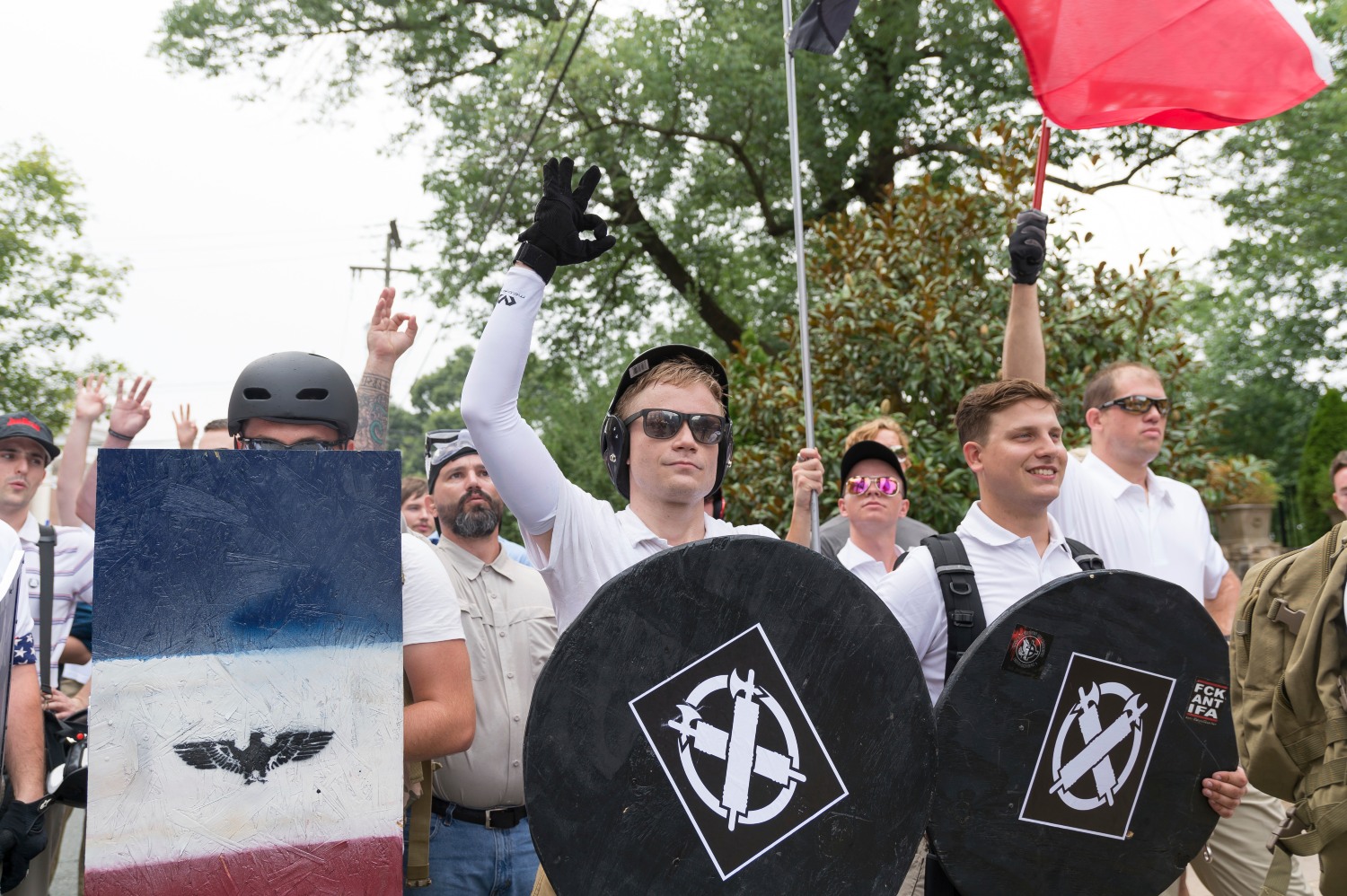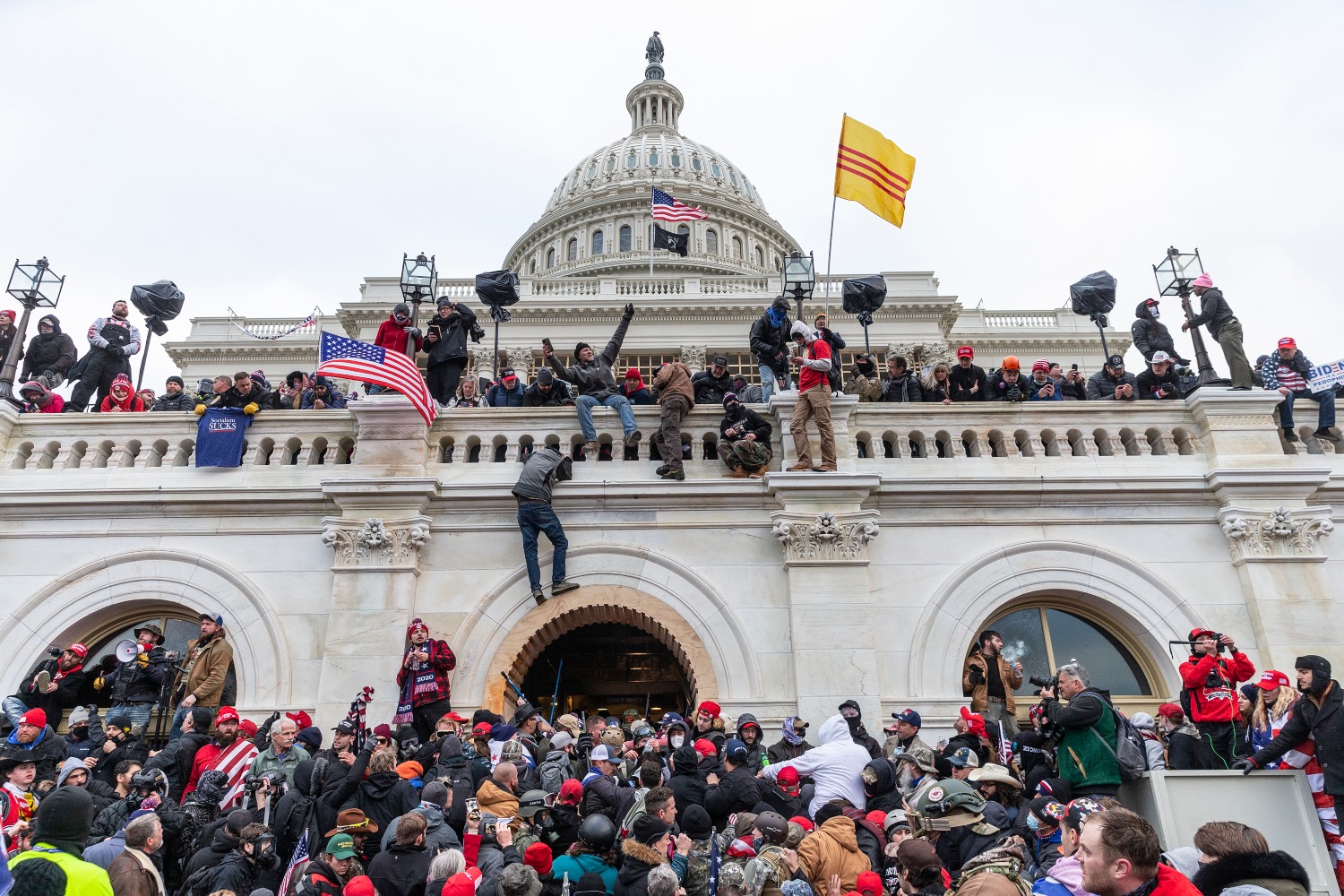Recent laws in Washington and Oregon, part of a slew of similar laws nationwide, were initially aimed at stopping harassment by extremist hate groups
By Daniel Walters / InvestigateWest
Arguably the most powerful weapon of anti-fascist groups in the Northwest is information.
Anonymous squads of amateur detectives — parts of groups with names like Stumptown Research Collective, FashFreeNW and Corvallis Antifa — spend months trying to sniff out the identities of those they consider right-wing extremists.
They pore through photos looking for clues — a ring on a finger, a flash of a recognizable tattoo — and match them with old social media accounts or other sources. And then they “dox” them — short for “releasing documents — exposing their real identities, along with a variety of personal information online.
In May, for instance, a coalition of anti-fascist groups throughout the West Coast posted to their website an extensive dossier on the man they claim is the heavily tattooed neo-Nazi leader of Evergreen Active Club, a hate group in Eastern Washington.
They directed their readers to the phone number for the construction company he works for. (“Let them know they are employing a Nazi gang leader.”) They pointed to not only his home address, but the emails and phone numbers for his partner’s mom and stepfather. (“Please reach out to them to make sure they know their daughter is a Nazi.”)
Even on the left, doxxing can be controversial — some argue it’s vigilantism, while others see it as the most effective nonviolent weapon they have to fight back against extremists.
But thanks to a new Washington state law, this type of activism may run the risk of getting anti-fascists sued by the very neo-Nazis they’re exposing. This legislation was pushed by another group dedicated to exposing racists and antisemites — the Anti-Defamation League, a national anti-hate organization.
“The Anti-Defamation League had witnessed extremists using doxxing tactics to intimidate and harass,” said the law’s sponsor, Washington state Sen. Drew Hansen. “I asked how I could be helpful in efforts to fight back against antisemitism and hate, and this was a proposal that they had been working on.”

Washington state Sen. Drew Hansen
Hansen’s bill, which took effect this July, doesn’t charge doxxers with a crime. It allows people to sue a doxxer if they were harmed — stalked, injured, threatened or criminally harassed — potentially winning $5,000 per violation, plus damages and attorney fees.
Hansen believes the bill is written narrowly enough that it shouldn’t worry anyone whose intentions aren’t malicious.
“My bill deals with doxxing only where you actually intend that someone is going to use the information to harm the person or you recklessly disregard that threat,” said Hansen, a Bainbridge Island Democrat.
Additionally, unlike the similar law passed in Oregon in 2021, Washington’s anti-doxxing law contains explicit protections for journalists. But it’s also notably broader than Oregon’s, allowing people to sue for showing “reckless disregard” of the risk of harassment for publishing personal information, instead of just malicious intent.
“It seems to me it very well could limit what you call ‘research into extremism,’” Washington state Rep. Jim Walsh, now the state Republican Party chair from Aberdeen, told the ADL during a hearing about the legislation.

In 2017, swarms of researchers tried to identify the white nationalists at the “Unite the Right” rally in Charlottesville, Virginia, to expose them, shame them or get them fired. (Photo by Albin Lohr-Jones/Pacific Press) (Sipa via AP Images)
Stephen Paolini, associate regional director of the Anti-Defamation League Pacific Northwest office, told InvestigateWest that groups like his are safe. But he said it is possible that tactics like “‘you should call this person or show up at their house and tell them why you hate Nazis’” could create the kind of harassment that could get you sued under the law.
He doesn’t think that’s a bad thing.
“As much as I may align with the goal of calling out Nazis, if you’re doing it in a way that’s opening people up to death threats, or bodily injury or stalking, that’s a problem,” Paolini said.
In Washingon and Oregon, Paolini said, the anti-doxxing bills had support from “labor unions, advocates for victims of sexual assault and domestic violence, law enforcement, marginalized communities groups, and many others.”
Still, some activists worry that these laws will be weaponized against those trying to expose extremists or oppose politicians.
Portland-based journalist Shane Burley, editor of a recent collection of essays from anti-fascist researchers, said the anti-doxxing laws are “scary” and “irresponsible.”
“It’s a profound misunderstanding of the problem,” he said. “And it will be used against journalists and activists.”
THE BATTLE ONLINE
As the sometimes violent clashes between left-wing “anti-fascists” and right-wingers have raged on the streets of the Pacific Northwest since the rise of Donald Trump, a parallel war was being waged online. Each side seeks to expose the other — triggering outraged followers to descend upon their targets.
John Hacker, a Portland-area activist who began videotaping far-right rallies and identifying extremists on social media in 2016,said he’s regularly targeted online by the far right with a lot of hateful comments.
“They get on Twitter and they publish everything from my address to all my brother’s personal information. Pictures of my vehicles, my house, my phone number, my daughter’s phone number,” Hacker said. “I had fliers posted all over my neighborhood with my mug shot.”
Commenters mocked the intense scarring left from the burns he suffered in a car accident.
While he has posted an extremist’s address online once, he generally thinks it’s a bad idea. Too much risk for violence. But Oregon’s law also considers posting the contact information of someone’s employer to be doxxing as well.
Hacker sees “call-in campaigns,” calling an extremist’s employer to put pressure on them to fire their employee, as acrucial and legitimate tool for trying to discourage far-right organizing.
“The right didn’t even use those tools very often until 2020,” Hacker said.
But that changed as racial justice protests ragedfor over 100 days in Portland that year following the killing of George Floyd by Minneapolis police officers. Hacker said right-wingers began posting the names and mug shots of protesters who’d been arrested. One media personality, Post Millennial editor Andy Ngo, was so infamous for this practice that protesters started referring to having their mug shot posted online as “getting Ngo’d.”
In the hearing for Oregon’s anti-doxxing bill, a protester described receiving countless bomb threats and death threats after one of Ngo’s posts.
Hacker said some progressives nicknamed the bill, along with a bill restricting the release of mug shots, the “Andy Ngo laws.”

As the sometimes violent clashes between left-wing “anti-fascists” and right-wingers have raged on the streets of the Pacific Northwest since the rise of Donald Trump, a parallel war was being waged online. (Gage Skidmore photo)
But Hacker — who once got in an altercation with Ngo where he briefly stole Ngo’s phone — said he doesn’t think Ngo was impacted by the bills at all. Generally, Ngo hasn’tpublished the kind of personal information that could get him in trouble under these new laws.
In a brief emailed statement, Ngo argued that the restriction on mug shots was “critically flawed,” but also said that he was glad that the Oregon law defined doxxing more narrowly than simply releasing the name of a person at a public demonstration or someone who had been arrested.
“That is not doxxing,” Ngo said. “That is often just reporting.”
As time passed, and as Portland’s protests settled down, Hacker said the left didn’t stand to benefit as much from the laws.
Today, the Portland journalist Burley said left-wing activists fear the laws will be wielded against them.
“People are certain of that,” Burley said. “I don’t know anybody that actually supports these laws.”
PROCESS AS PUNISHMENT
After a far-left mole from Seattle infiltrated the white nationalist group Patriot Front in 2021 and leaked the identity of members, the group looked to the law for payback. Chat messages, leaked to the left-wing journalism outfit Unicorn Riot, show group members searching for an anti-doxxing law in Washington state that could help them “legally retaliate against the mole.”
But Washington’s law hadn’t been passed yet. When Patriot Front members filed a lawsuit against the infiltrator accusing him of “malicious doxxing,” they relied on federal law and invasion of privacy and computer fraud statutes. The lawsuit is still in its early stages.
Paolini, with the ADL, is confident that Oregon’s and Washington’s anti-doxxing laws “would not be subject to abuse of lawsuits by the very groups that we seek to, frankly, dismantle, undermine, and counter.”
Indeed, the ADL had opposedOregon’s original version of the bill because they worried that letting people sue over doxxing with an intent to merely “humiliate” was too broad and potentially unconstitutional. But they believed the final bill, requiring plaintiffs to show their doxxer intended, at minimum, to harass them in a way likely to cause “severe emotional distress,” struck the right balance.
But Adam Steinbaugh, attorney for the Foundation for Individual Rights and Expression, says the laws in both states are unconstitutional. Upon reading Washington state’s law, he laughed.
“It would be tough to find an example of speech that is addressed by this law that is not protected speech,” says Steinbaugh. “It just gives the powerful a tool to use the legal system as a cudgel to silence people.”
Shortly after Oregon’s anti-doxxing passed in 2021, several school board members in Newberg, Oregon, used it to sue their critics, alleging several parents and teachers had posted information about the board members’ other jobs on a private Facebook group.
An Oregon circuit court allowed the case to proceed, concluding that by sharing the contact information for the athletic director at the high school where a board member worked, at least one of the activists potentially had violated the law.
In July, however, the Oregon Court of Appeals reversed the decision, ruling that the board members hadn’t made the case that a reasonable person would have experienced the “severe emotional distress” the law required. Unless the Oregon Supreme Court weighs in, the school board’s critics are victorious. But even for winners, litigation has a cost. One of the plaintiffs who was dropped from the case early on, Newberg teacher Katherine Barnett, announced last year she was resigning.
“I continue to feel like there’s a target on my back,” Barnett wrote. “I have anxiety attacks whenever there is a board meeting because I don’t know what you have up your sleeve.”
The larger impact of these bills is unknown. Since Oregon’s law was passed, the number of doxxing incidents reported to Oregon’s Department of Justice Bias Response Hotline went from eight in 2021 to 103 in 2022, though those reports can be influenced by a number of factors.
Other than the Newberg case, InvestigateWest could not find any example of the anti-doxxing law being used in either Washington or Oregon.
“There hasn’t been a significant amount of case law on this issue,” said Paolini.
WHO’S DOXXING WHOM?
Plenty of other states including Maryland, Nevada, Illinois, Texas and Colorado have passed anti-doxxing bills. In New Jersey, a journalist used public records to discover a police director lived two hours away from the community he served — but then was threatened under the state’s anti-doxxing law for exposing the name of the street the police director lived on.
In the wake of the violent conflict in Israel and Gaza, the issue of doxxing of anti-Israel protesters has taken on national prominence.
Ari Hoffman, a conservative talk show host in Seattle, has been naming and shaming what he writes are “terrorist supporters, sympathizers and useful idiots” in anti-Israel and pro-Palestinian protests, particularly at the University of Washington.
“Which Jew-hater should we expose tonight?” Hoffman wrote in an Oct. 31 social media post.
Hoffman, who says he doesn’t expose anything that isn’t already public, was doxxed himself in 2019. A photo of his house and his Israeli flag was posted on an antisemitic website, along with a slew of murder fantasies.
“I get how serious this is,” said Hoffman. “I have security sitting outside my house.”
But he’s opposed to Washington state’s anti-doxxing bill. It’s too broad, he said, and too likely to hurt free speech.
“I don’t know what the solution is,” Hoffman said. “But I don’t think it’s government. And I wish there was a solution. Because, look, I don’t want what happened to me. Who would?”
FEATURED IMAGE: In 2021, self-styled “sedition hunters” sought to track down the rioters at the U.S. Capitol and get them arrested. (Photo by Lev Radin/Sipa USA)(Sipa via AP Images)
InvestigateWest (invw.org) is an independent news nonprofit dedicated to investigative journalism in the Pacific Northwest. A Report for America corps member, Daniel Walters covers democracy and extremism across the region. He can be reached at daniel@invw.org.



